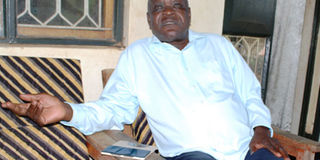Retired with his wits and passion for teaching

Charles Ebong talks to our reporter at his home in Masaka. he does not regret ending up as a teacher but would have loved to have gained more from it. PHOTOS BY Ivan Kimbowa
What you need to know:
- Although Charles Ebong wanted to become a lwayer, lack of money to pay for a law degree at Makerere University led him to Kyambogo University to pursue an education course. This, however, was a blessing in disguise.
- “He was dedicated and always worked extra hours. Even at night, he stayed at the institute to monitor students. I do not remember any student in our year failing to get employed after graduating considering the knowledge we had acquired.” Joseph Kabanda, a road engineer
On a Wednesday afternoon, I meet Charles Ebong at his home in Kumbu, a Masaka suburb. The retired Principal of Kamengo Technical Institute in Rakai District was born on November 2, 1957, to the late Kelementina Achola in Etamu Village in present day Amolatar District.
Education
While living with his uncle Fastino Ogwanga, Ebong sat his Primary Leaving Examinations at Abwonga Primary School and later joined St. Joseph’s College Layibi for O and A’Level.
Ebong says he did not want to become a teacher at first but changed his mind when he could not get adequate funds to pursue Law at Makerere University.
“After getting the East African Advanced Certificate [presently Uganda Advanced Certificate of Education], I failed to get enough money to join Makerere University. I decided to join Kyambogo for a diploma in secondary education. Although this is not what I wanted to study, my passion grew and when I started teaching many of my students excelled in Metal Work and Technical Drawing, a subject I used to teach at Kako Secondary School in Masaka,” he says.
At the school, Ebong took on a number of responsibilities including being the games master, acting food caterer, house master, and teacher’s representative on the school board. Around the same time, he met and married Dorah Kabonesa, who had joined the school as a chemistry teacher.
After his 18-year stint at Kako SS, the Ministry of Education assigned Ebong as a caretaker at Kitabi Community Polytechnic Instructor’s College in Bushenyi District. He was later promoted to substantive principal until 2004 when he was posted to Kamengo Technical Institute where he retired on November, 2, 2016.
Other sources of income
Despite teaching with great passion, Ebong says he did not earn much from this profession. He says his income was mostly supplemented by making windows and doors.
“Through teaching metal work and technical drawing, I was able to set up a business where my students would also acquire practical skills during the holidays.” Ebong says.
He adds that together with his wife, they have set up Kabonesa Secondary School in Hoima District and with a stable income from both businesses, they have managed to educate their children.
James Ssekamwa, Ebong’s colleague at Kako SS says he was hardworking and always focused on coming up with ideas to benefit students by improving their performance in education and co-curricular activities.
Paddy Menya, the current principle of Kamengo technical institute says Ebong initiated a number of programmes that have helped the institution to realise a lot of success. “…We are known in so many different areas because of our good performance that was reinforced by Ebong.”
Challenges
Although Ebong speaks highly of his success as an educationist, he expresses frustration at not being promoted despite working diligently as a teacher for 18 years at Kako SS. “While at Kamengo Technical Institute, it was a hurdle trying to convince parents to enroll their children because they thought only failures belonged to such institutions,” he says.
He also talks of failure to convince the Ministry of education to make Technical Drawing compulsory in secondary schools as the only way of sharpening and focusing the young generation in one direction of creativity and development. “Crucial subjects especially technical drawing should be made compulsory if we are to have an innovative generation,” he says.
What people say about her
“Ebong contributed much towards our success at Kamengo Technical Institute. “He did not force us to read books but advised us to focus beyond classroom. We ended up doing more research beyond what our instructors taught us,” Robert Ssettuba, an electric engineer.
“He was dedicated and always worked extra hours. Even at night, he stayed at the institute to monitor students. I do not remember any student in our year failing to get employed after graduating considering the knowledge we had acquired.” Joseph Kabanda, a road engineer




